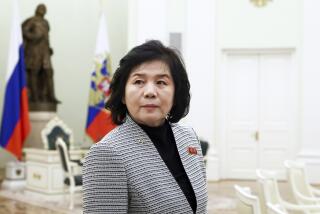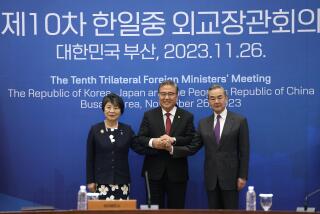N. Korea Says It Will Return to Arms Talks
- Share via
SEOUL — North Korea promised a high-ranking delegation of Chinese officials visiting Pyongyang that it would return to six-party talks in an attempt to craft a diplomatic solution to the ongoing nuclear crisis, China Central Television reported Thursday.
The pledge was elicited during a meeting earlier in the day between North Korean leader Kim Jong Il and China’s Wu Bangguo, head of the legislature and the second-ranking Chinese official. It comes amid other encouraging signs that North Korea is increasingly willing to give up its nuclear weapons program for guarantees that the United States will not try to topple its leadership in an Iraq-style invasion.
“China and the Democratic People’s Republic of Korea [North Korea] agreed in principle here Thursday to continue the process of six-party talks,” the official New China News Agency reported.
Chinese media also reported that Wu had invited the North Korean leader to visit China and quoted Kim saying he would “make the visit soon, at an appropriate time.”
North Korea’s official news agency confirmed that the country had agreed to return to negotiations.
“The DPRK side expressed its willingness to take part in the future talks if they provide a process of putting into practice the proposal for a package solution based on the principle of simultaneous actions,” the Korean Central News Agency reported. “To this end, both sides agreed in principle to pursue the course of the six-way talks.”
White House officials said they were encouraged by the news.
“The president has made it very clear that the multilateral or the multiparty process provides the best hope for achieving our shared objective of getting North Korea to abandon its nuclear ambitions and end its nuclear weapons program,” White House Press Secretary Scott McClellan told reporters aboard Air Force One as the president flew to Ohio.
McClellan reiterated a statement President Bush made this month at a meeting of Asia-Pacific leaders in Bangkok, Thailand, that the United States would sign some kind of collective security guarantee for North Korea, although Bush emphasized the concession would take place only if Pyongyang made “verifiable” progress toward dismantling its weapons programs.
China is North Korea’s closest ally and the major supplier of food and fuel to the impoverished and isolated Stalinist state. It has been trying to nudge the North Koreans into dropping their nuclear weapons program and was host for two rounds of negotiations this year in Beijing.
The last round in August ended on a disappointing note, with the United States and North Korea stalemated over who should make the first move and the other parties to the six-way talks -- China, Russia, Japan and South Korea -- exasperated by the demands of the two principal players.
Since then, both the U.S. and North Korea have climbed back from what the other parties saw as untenable positions.
Given the continuing entanglement in Iraq, the prospect of the United States taking military action against North Korea has dimmed and the Bush administration has been increasingly willing to negotiate. North Korea last weekend signaled it would drop a demand that the United States sign a formal non-aggression pact and would accept a less-formal statement.
“I think the North Koreans realize that there is a window of opportunity,” said Jeong Se Hyun, South Korea’s unification minister, in a meeting this week with foreign journalists. “We have been telling them that in the aftermath of the Iraq war, the doves have gained the upper hand over the hawks in Washington and that they cannot afford to miss this chance.”
Jeong, who is South Korea’s top official on North-South relations and a frequent visitor to Pyongyang, predicted that the new round of negotiations would revolve around the question of “simultaneous action” -- with the North insistent that it will not dismantle its nuclear program unless the Bush administration promises not to attack.
Reportedly, there were encouraging developments as well in informal talks held Oct. 24 in New York between Han Song Ryol, North Korea’s deputy ambassador to the United Nations, and David Straub, a state department official.
The Japanese newspaper Asahi Shimbun reported Thursday that the North Korean said his country might be willing to accept a document as simple as a signed letter from Bush. Another North Korean official reportedly told attendees at an academic conference last month that his country was looking for something like the joint communique issued in October 2000 in the waning days of the Clinton administration, when the United States and North Korea affirmed they would respect each other’s sovereignty and build closer ties.
Relations soured after Bush took office and labeled North Korea part of an “axis of evil,” along with Iraq and Iran.
*
Times staff writer Maura Reynolds in Washington contributed to this report.
More to Read
Sign up for Essential California
The most important California stories and recommendations in your inbox every morning.
You may occasionally receive promotional content from the Los Angeles Times.













